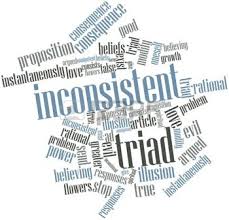This essay strikes an excellent balance between being concise and being thorough in laying out the arguments and viewpoints of various Christian schools of eschatological thought without resorting to caricatures. His project is careful to present each of these viewpoints at their strongest, for only then can productive dialogue occur.
Back to part 2
**********
Before looking at each of the three primary eschatological views in greater detail, let’s look once more at the Inconsistent Triad with the aid of a diagram:
A few notes:
- The
3 primary eschatological views are placed on the length of the triangle
that connects the two points (the propositions) that each view accepts.
The 3rd point represents the proposition that is rejected.
- The
proposition labels (Sovereignty, Unconditional Love, Everlasting
Separation) are obviously not without ambiguity, and each of the 3 primary
eschatological views may argue that their “rejection” of the label is
either inaccurate or subject to clarification. The meaning of these
terms is, of course, very much a part of the essay. In any case, I
think that these 1-2 word descriptions are helpful.
- When
considering the word “separation” in proposition 3, bear in mind Talbott’s
definition of salvation as reconciliation, or “even a kind of union”.
“Separation” need not be geographical, but is rather a “disunion” or
“estrangement”.
**********
Talbott summarizes:
"Augustinians (named after St. Augustine of Hippo) believe strongly in both the sovereignty of God’s will (proposition 2) and the reality of an everlasting separation from God (proposition 3), they finally reject the idea that God’s unconditional (or electing) love extends to all humans equally (proposition 1)."
"The Arminians (named after Jacob Arminius for his opposition to the Augustinian understanding of limited election) believe in both God’s equal love for all (proposition 1) and the reality of an everlasting separation from God (proposition 3), they finally reject the idea that God’s desire to win over all will by fully satisfied (proposition 2)."
"Christian universalists believe in both God’s equal love for all (proposition 1) and the ultimate triumph of his loving will (proposition 2), they finally reject altogether the idea of an everlasting separation from God (proposition 3)."**********
Consider, once again, just how different these 3 views are.
Talbott concludes the Three Primary Eschatological Views section with a penetrating question:
“Which system of theology best preserves the praiseworthy character and the glory of the divine nature?”Does this question make you squirm a little bit? Does it make you uneasy?
Given the possible variety of things that might constitute "praiseworthy character", perhaps you find it hopelessly subjective. You may be tempted to argue that a particular view is objectively "right" thereby dismissing the questions of "praiseworthy character" and "glory" as subjective and twisted by "modern sentimentality". Or perhaps you sense a certain tension between divine attributes (like justice and mercy). Or perhaps you view God's "goodness" and man's "goodness" as completely different.
Despite these (or a great many other) protests, it is a paradigm shaping question. It requires humility. And yet we must ask and answer as best we know how. We have moved to precarious territory if we argue that the truth does not "preserve the praiseworthy character of God" or conflate goodness with sheer power. Always keep this question in mind as we move forward, because it is the deeper question to which all the philosophical language and precision points. We shall see how the various eschatological views address the question as we proceed.
We'll now move into the meat of the essay.









